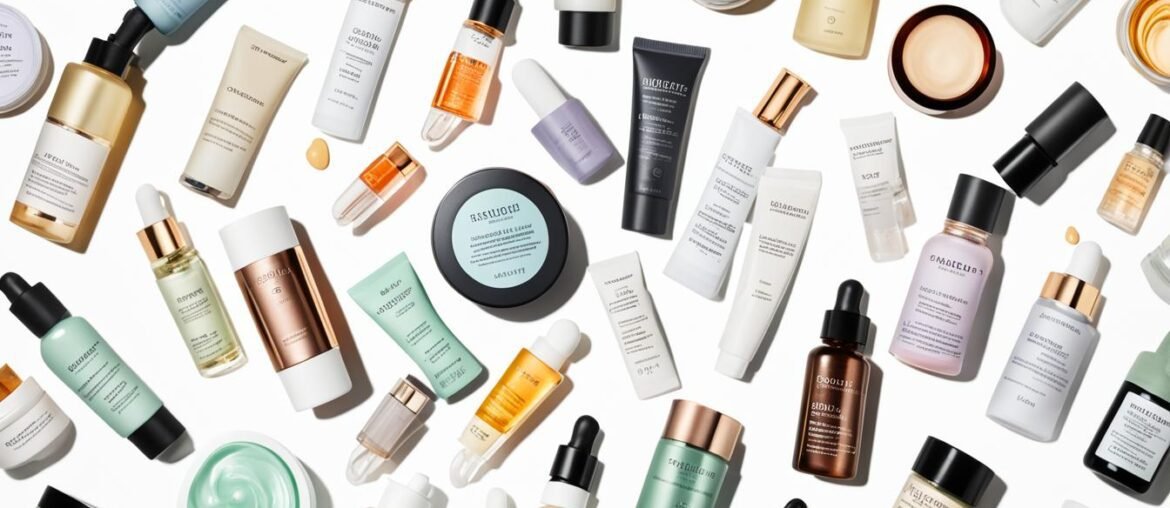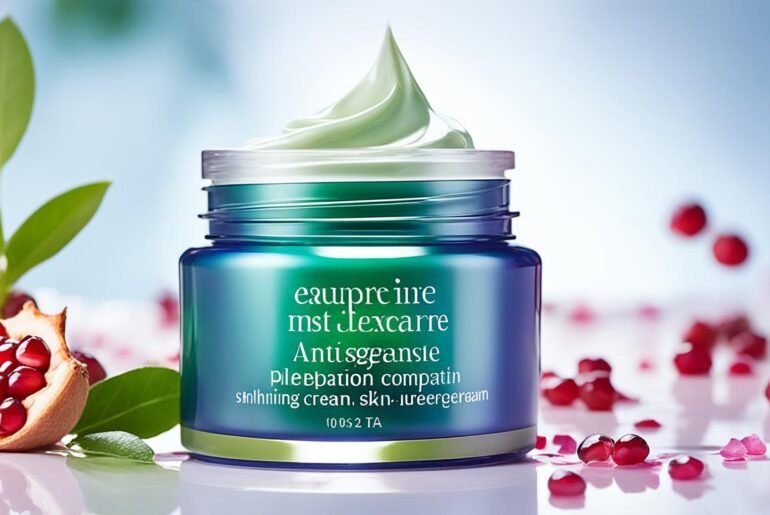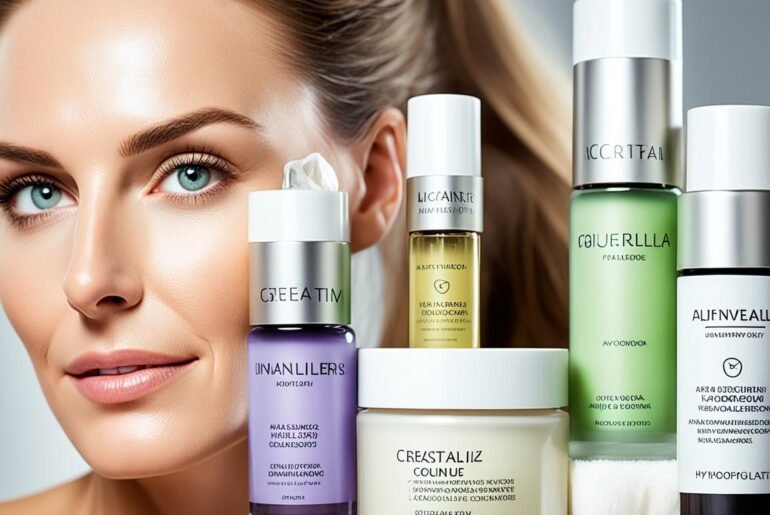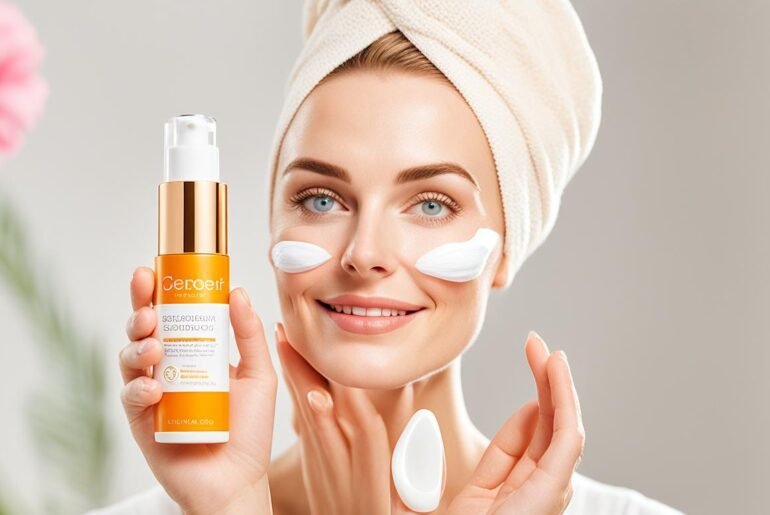Did you know that the global anti-aging skin care market is projected to reach a staggering $52.5 billion by 2027? That’s a testament to the growing demand for products that can help defy the signs of aging and keep our skin looking youthful and radiant.
Aging is a natural process that affects us all, but with the right anti-aging skin care routine and products, we can minimize the appearance of wrinkles, fine lines, and other signs of aging. In this article, I will guide you through the best anti-aging skin care routine products that can help rejuvenate your complexion and give you the confidence to put your best face forward.
Key Takeaways
- The global anti-aging skin care market is projected to reach $52.5 billion by 2027, underscoring the popularity and importance of anti-aging products.
- An effective anti-aging skin care routine can help minimize the appearance of wrinkles, fine lines, and other signs of aging.
- By using the right products and following a consistent routine, you can achieve a youthful and radiant complexion.
- It’s essential to understand the role of collagen in aging skin and how to boost collagen production for firmer and smoother skin.
- The morning and evening skincare routines each have their own unique steps and products to address specific skin concerns and provide optimal care.
The Role of Collagen in Aging Skin
As we age, collagen production in our skin naturally declines, leading to noticeable changes in its appearance and functionality. Collagen, a protein found in abundance in our skin, plays a vital role in maintaining its firmness, elasticity, and smoothness. Unfortunately, starting from around the age of 25, our bodies produce less collagen, which contributes to the visible signs of aging.
Various factors, such as sun exposure and environmental aggressors, can further accelerate the loss of collagen. These external stressors, along with the natural aging process, can lead to the breakdown of collagen, resulting in sagging skin, wrinkles, and a dull complexion.
To counteract the effects of collagen loss and slow down the aging process, it is crucial to incorporate skin care products that promote collagen production and protect against free radical damage. By boosting collagen levels, we can help restore the skin’s firmness and improve its overall functionality.
The Importance of Collagen Production
Collagen is essential for maintaining the structural integrity and functionality of our skin. It provides a framework for supporting the upper layers and helps preserve the smooth and supple appearance we associate with youthful skin.
Additionally, collagen is responsible for facilitating the production of elastin and hyaluronic acid, two other important components of healthy skin. Elastin gives skin its elasticity, while hyaluronic acid keeps it hydrated and plump.
By promoting collagen production, we can restore these vital elements and combat the visible effects of aging, such as fine lines, wrinkles, and sagging skin. This can result in a more youthful, rejuvenated complexion.
“Collagen acts as a foundation for healthy skin, providing the necessary support and structure to keep it looking youthful and vibrant.”
Boosting Collagen with Skincare Products
Fortunately, there are skincare products available that can help stimulate collagen production and improve skin functionality.
Ingredients such as retinol, peptides, and vitamin C are known for their collagen-boosting properties. By incorporating these ingredients into our skincare routines, we can encourage the production of new collagen and minimize the visible signs of aging.
Furthermore, protecting our skin from damaging free radicals is crucial for maintaining collagen levels. Incorporating antioxidants, such as vitamin C and green tea extract, can help neutralize these harmful molecules and preserve collagen in the skin.
| skincare products for collagen production | key ingredients |
|---|---|
| Retinol Cream | Retinol, vitamin A derivatives |
| Peptide Serum | Peptides, amino acids |
| Vitamin C Serum | Vitamin C, antioxidants |
By incorporating these collagen-boosting skincare products into our routines, we can help revitalize our skin and maintain a youthful, radiant complexion.
Morning Skincare Routine
The morning is all about protecting the skin from daily stressors like UV exposure, pollution, and blue light. To start your morning anti-aging routine, a gentle face wash is recommended, followed by a powerful antioxidant serum to combat oxidative stress. A day cream with moisturizing and wrinkle-plumping properties is essential, and don’t forget sunscreen, a key element for every morning routine to protect against premature signs of aging.
For a comprehensive morning routine that targets signs of aging and provides antioxidant protection, follow these steps:
- Start by cleansing your face with a gentle face wash to remove any dirt, makeup, or oils accumulated overnight. This will ensure a clean canvas for the rest of your routine.
- Next, apply a few drops of a high-quality antioxidant serum. Look for serums that contain ingredients like vitamin C, which helps combat oxidative stress and brightens the skin.
- Follow up with a day cream that suits your skin type and specific concerns. Look for moisturizers that are hydrating, nourishing, and have wrinkle-plumping properties. Ingredients like hyaluronic acid and peptides can help moisturize and firm the skin.
- Lastly, apply sunscreen with a minimum SPF of 30 to protect your skin from harmful UV rays. Make sure to choose a broad-spectrum sunscreen that shields against both UVA and UVB rays.
Remember, consistency is key when it comes to skincare routines. Make sure to follow these steps every morning to maintain healthy, youthful-looking skin.
Example Morning Skincare Routine:
| Step | Product |
|---|---|
| 1 | Gentle Face Wash |
| 2 | Antioxidant Serum |
| 3 | Day Cream |
| 4 | Sunscreen |
Evening Skincare Routine
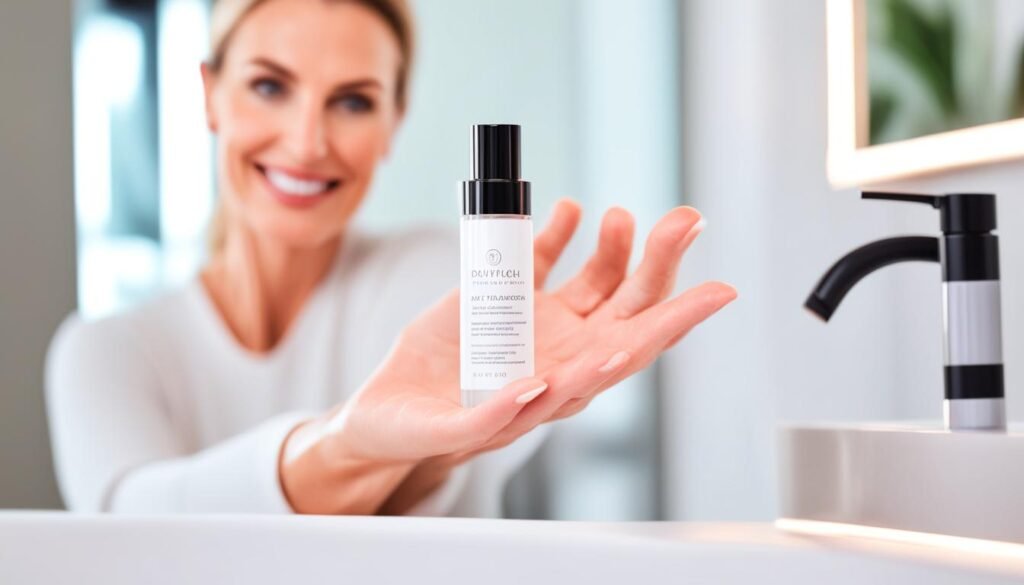
An evening anti-aging routine is essential for repairing and recovering your skin after a long day. By following these steps, you can wake up to a refreshed and rejuvenated complexion.
Cleanser
Start your evening routine by thoroughly cleansing your skin to remove makeup, dirt, and impurities accumulated throughout the day. Choose a gentle cleanser that suits your skin type, such as the Neutrogena Hydro Boost Hydrating Cleansing Gel, which effectively cleanses without stripping away essential moisture.
Retinoid
Retinoids are powerful ingredients that can target fine lines, wrinkles, and sun damage. Apply a pea-sized amount of retinoid, such as the Paula’s Choice Clinical 1% Retinol Treatment, to your face before bed. It’s important to start with a low concentration and gradually increase over time to minimize potential irritation.
Peptides
Peptides are amino acids that can help firm the skin and improve its elasticity. Look for serums or creams containing peptides, like the The Ordinary “Buffet”, to incorporate into your evening routine. Gently massage a few drops onto your skin to enhance its firmness and resilience.
Exfoliating Acids
Exfoliating acids, such as alpha-hydroxy acids (AHAs) or beta-hydroxy acids (BHAs), help remove dead skin cells and promote cell turnover. Incorporate an exfoliating toner or serum, like the Pixi Glow Tonic with glycolic acid, into your routine a few times a week to reduce dullness, promote brightness, and refine the texture of your skin.
Night Moisturizer
Finish off your evening routine with a nourishing night moisturizer to provide hydration and support skin regeneration while you sleep. Look for products with ingredients like hyaluronic acid and ceramides, such as the CeraVe Facial Moisturizing Lotion PM, to lock in moisture and strengthen your skin barrier.
Remember, consistency is key when it comes to skincare. Stick to your evening routine and give your skin time to reap the benefits of these powerful ingredients. With diligence and proper care, you can maintain a youthful glow and combat the signs of aging.
Incorporating New Ingredients
When it comes to skincare, the beauty industry is constantly evolving, with new skincare ingredients being introduced regularly. These innovative ingredients can provide unique benefits and address specific skin concerns. However, it’s important to approach these new skincare ingredients with caution to avoid potential reactions or irritation.
When incorporating new skincare ingredients into your routine, it’s best to introduce them one at a time. This allows you to observe how your skin reacts and determine if any adverse effects occur. By slowly incorporating new ingredients, you can better pinpoint their efficacy and suitability for your skin type.
Consulting a dermatologist or skincare professional is highly recommended, especially when incorporating potent or unfamiliar ingredients into your routine. They can provide valuable insights and guidance on how to use these ingredients safely and effectively.
In-office procedures can complement your at-home skincare routine and further enhance results. Procedures like chemical peels, microdermabrasion, or laser treatments can help address specific skin concerns or target deeper layers of the skin. However, it’s crucial to consult a qualified professional to ensure the procedure is appropriate for your skin type and concerns.
Consistency is key when it comes to skincare. Regular application of skincare products is necessary to interact with skin cells and achieve significant results. It’s important to maintain a consistent skincare routine to allow the active ingredients enough time to work and deliver their intended benefits.
The Power of Sunscreen
Sunscreen is a non-negotiable part of any skincare routine, especially for anti-aging. Protecting the skin from UV rays reduces the risk of skin cancer and sun damage, which can lead to premature signs of aging like wrinkles and age spots.
Wearing sunscreen daily is essential, even on cloudy days or during the winter months when the sun may not be as intense. Ultraviolet (UV) radiation can penetrate through clouds and windows, causing damage to the skin. By incorporating sunscreen into your daily routine, you can safeguard your skin against harmful UV radiation and maintain its youthful appearance.
When choosing a sunscreen, it’s important to look for a broad-spectrum formula that offers protection against both UVA and UVB rays. The SPF (Sun Protection Factor) rating indicates how effectively the product blocks UVB rays. For optimal protection, select a sunscreen with at least SPF 30.
Another key factor to consider is the reapplication of sunscreen. Sunscreen should be reapplied every two hours, especially if you are spending prolonged periods outdoors or engaging in activities that may cause sweating or rubbing. By consistently reapplying sunscreen, you ensure that your skin remains protected throughout the day.
“Sunscreen is like a shield for your skin, protecting it from the harmful effects of the sun’s rays.”
In addition to its role in preventing premature signs of aging, sunscreen also plays a crucial role in reducing the risk of skin cancer, which can be caused by prolonged exposure to UV radiation. By incorporating sunscreen into your skincare routine, you take a proactive step towards maintaining healthy and youthful-looking skin.
The Benefits of Antioxidants

Antioxidants play a crucial role in anti-aging skincare. These powerful compounds help protect the skin from free radical damage, which can lead to premature aging and other skin concerns. One key antioxidant that has gained popularity in the beauty industry is vitamin C.
Vitamin C is known for its incredible skincare benefits. It not only helps prevent signs of aging but also stimulates collagen production, improves skin elasticity, and brightens the complexion. By neutralizing free radicals caused by UV light, pollution, and stress, vitamin C helps to maintain skin health and enhance its overall appearance.
When shopping for skincare products, look for serums that contain vitamin C as a star ingredient. These serums are formulated to deliver high concentrations of antioxidants directly to the skin, providing targeted protection against free radical damage. Incorporating a vitamin C serum into your daily routine can help improve the texture, tone, and radiance of your skin.
Essential Ingredients for Hydration
When it comes to anti-aging skincare, hydration is key. Properly moisturized skin not only feels plump and supple, but it also helps reduce the appearance of fine lines and wrinkles. To achieve optimal hydration, two essential ingredients to look for in your skincare routine are hyaluronic acid and ceramides.
Hyaluronic acid is a powerful humectant that attracts and retains moisture, making it a go-to ingredient for hydrating the skin. By binding water molecules to the skin, hyaluronic acid helps restore skin elasticity and reduce the appearance of dryness and dullness. Incorporating products like moisturizers and serums with hyaluronic acid can deliver intense hydration, leaving your skin looking rejuvenated and plump.
In addition to hyaluronic acid, ceramides are another essential ingredient for maintaining optimal skin hydration. Ceramides are naturally occurring lipids found in the skin’s outermost layer, helping to form a protective barrier that locks in moisture and keeps irritants out. By supplementing the skin with ceramides, you can enhance its natural barrier function and prevent water loss, resulting in a hydrated and healthier complexion.
So, if hydrated and healthy skin is your goal, make sure to incorporate products containing hyaluronic acid and ceramides into your skincare routine. Look for moisturizers, serums, and other skincare products that specifically highlight these ingredients to provide your skin with the optimal hydration it needs to stay youthful and radiant.
FAQ
What are the best anti-aging products for a skincare routine?
The best anti-aging products for a skincare routine include a gentle face wash, antioxidant serum, day cream, retinoid, peptides, exfoliating acids, and night moisturizer.
What is the role of collagen in aging skin?
Collagen is responsible for keeping our skin firm, taut, and smooth. As we age, collagen production declines, leading to wrinkles and loss of elasticity.
What should be included in a morning anti-aging skincare routine?
A morning anti-aging routine should include a gentle face wash, antioxidant serum, day cream with moisturizing and wrinkle-plumping properties, and sunscreen for sun protection.
What should be included in an evening anti-aging skincare routine?
An evening anti-aging routine should include a cleanser to remove makeup and buildup, a retinoid to target fine lines and wrinkles, peptides for firming the skin, exfoliating acids to reduce dullness, and a night moisturizer for skin regeneration.
How should I incorporate new skincare ingredients into my routine?
It’s best to introduce new skincare ingredients one at a time to minimize potential reactions or irritation. Consulting a dermatologist and maintaining consistency in application is important for optimal results.
Why is sunscreen important for anti-aging?
Sunscreen is crucial for anti-aging as it protects the skin from UV rays that can cause skin damage and premature signs of aging like wrinkles and age spots.
What are the benefits of antioxidants in skincare?
Antioxidants, such as vitamin C, help prevent aging, stimulate collagen production, and brighten the skin by fighting free radical damage caused by UV light, pollution, and stress.
What are essential ingredients for hydration in an anti-aging skincare routine?
Essential ingredients for hydration in an anti-aging skincare routine include hyaluronic acid, which attracts moisture to the skin for a plumping effect, and ceramides, which help seal in moisture and support the natural skin barrier.

